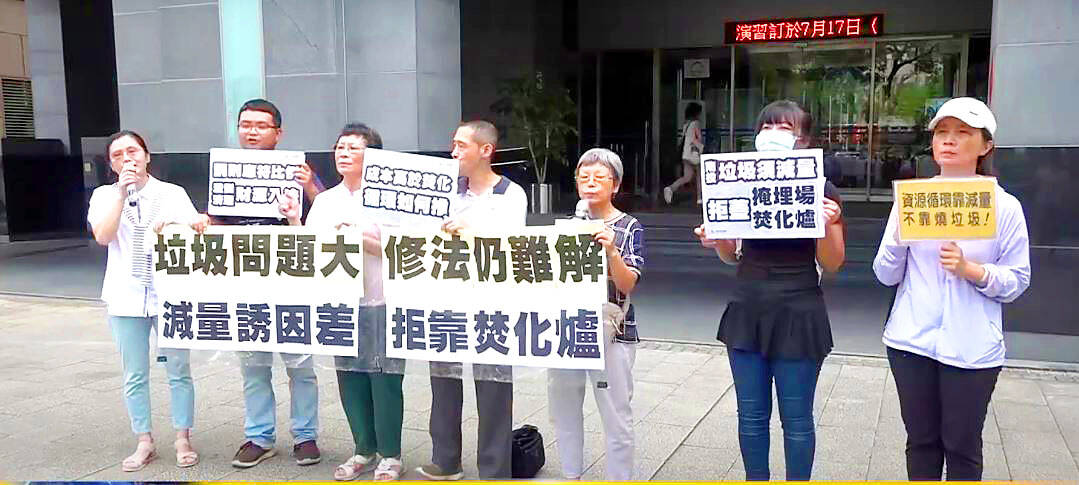Environmental groups on Wednesday urged the Ministry of Environment to increase penalties for illegal dumping, and implement incentives for waste reduction and recycling in its draft amendments to waste management laws.
The ministry on Wednesday held a meeting to discuss draft amendments to the Waste Disposal Act (廢棄物清理法) and the Resource Recycling Act (資源回收再利用法).
Tonnes of waste illegally dumped nationwide, including those piled up under the guise of reuse, incurred billions of waste disposal costs over the past few years, but the penalties for illegal dumping proposed in the draft amendments remain disproportionately low, Government Watch Alliance chief executive officer Hsu Hsin-hsin (許心欣) said.

Photo: screen grab from YouTube
For example, more than 1,000 tonnes of illegal dumping at a site near Kaohsiung’s Matou Mountain (馬頭山) required more than NT$100 million (US$3.4 million) of disposal fees, but the Kaohsiung Environmental Protection Bureau imposed penalties of only NT$80,000, alliance convenor Chen Jiau-hua (陳椒華) said.
Tighter regulation of so-called “recyclable side products,” such as fiber-reinforced plastic powders or high-tech sludge, is also required, Taiwan Watch Institute secretary-general Herlin Hsieh (謝和霖) said.
Such waste is often illegally dumped at soil resource stacking sites or near rivers or farmland under the guise of reuse and has caused environmental contaminations, he said, adding that both the upper and lower limits of monetary penalties for such illegal dumping must be raised to deter unscrupulous waste management operators.
Changhua Environmental Protection Union researcher Lin Cheng-han (林政翰) said that illegal dumping has become an offense with low risk, extremely low costs and high profit margins in Taiwan due to disproportionately light punishments and difficulties collecting evidence.
It is difficult to give evidence on how an incident of illegal dumping has caused environmental pollution that would harm people’s health, he said.
The bill should increase the minimum basic punishment for illegal dumping to a three-year jail term, Lin said, adding that illegal dumping on farmland or environmentally sensitive areas should be punishable by a jail term of up to 10 years.
Meanwhile, the Taiwan RE-THINK Environmental Education Association yesterday said that energy drink bottles have become the third-most common garbage found on beaches behind bottles containing water or tea.
The association analyzed 8,249 pieces of garbage collected from 59 beaches across Taiwan from April last year to April.
Data showed that plastic bottles remained as the most common garbage material at 67.4 percent, or 5,677 pieces, followed by glass bottles at 14.8 percent, and tin or aluminum cans at 5.4 percent, it said.
In terms of product type, 2,356 pieces were water bottles, accounting for the most at 28 percent, followed by tea bottles at 21.7 percent, or 1,826 pieces, and energy drink bottles at 15.6 percent, or 1,313 pieces, the association said.
Energy drinks are popular with anglers and tourists as the bottles are usually small and convenient to carry during outdoor activities, it said.
However, most energy drink bottles are glass, which are more difficult to recycle or decompose, and they are often left on beaches for years, the association said, urging people to fulfill their responsibility to recycle, it added.
People discarding litter at beaches can be fined NT$1,200 to NT$6,000, the association said.

The Coast Guard Administration (CGA) yesterday said it had deployed patrol vessels to expel a China Coast Guard ship and a Chinese fishing boat near Pratas Island (Dongsha Island, 東沙群島) in the South China Sea. The China Coast Guard vessel was 28 nautical miles (52km) northeast of Pratas at 6:15am on Thursday, approaching the island’s restricted waters, which extend 24 nautical miles from its shoreline, the CGA’s Dongsha-Nansha Branch said in a statement. The Tainan, a 2,000-tonne cutter, was deployed by the CGA to shadow the Chinese ship, which left the area at 2:39pm on Friday, the statement said. At 6:31pm on Friday,

The Chinese People’s Liberation Army Navy’s (PLAN) third aircraft carrier, the Fujian, would pose a steep challenge to Taiwan’s ability to defend itself against a full-scale invasion, a defense expert said yesterday. Institute of National Defense and Security Research analyst Chieh Chung (揭仲) made the comment hours after the PLAN confirmed the carrier recently passed through the Taiwan Strait to conduct “scientific research tests and training missions” in the South China Sea. China has two carriers in operation — the Liaoning and the Shandong — with the Fujian undergoing sea trials. Although the PLAN needs time to train the Fujian’s air wing and

Taiwanese celebrities Hank Chen (陳漢典) and Lulu Huang (黃路梓茵) announced yesterday that they are planning to marry. Huang announced and posted photos of their engagement to her social media pages yesterday morning, joking that the pair were not just doing marketing for a new show, but “really getting married.” “We’ve decided to spend all of our future happy and hilarious moments together,” she wrote. The announcement, which was later confirmed by the talent agency they share, appeared to come as a surprise even to those around them, with veteran TV host Jacky Wu (吳宗憲) saying he was “totally taken aback” by the news. Huang,

The American Institute in Taiwan (AIT) put Taiwan in danger, Ma Ying-jeou Foundation director Hsiao Hsu-tsen (蕭旭岑) said yesterday, hours after the de facto US embassy said that Beijing had misinterpreted World War II-era documents to isolate Taiwan. The AIT’s comments harmed the Republic of China’s (ROC) national interests and contradicted a part of the “six assurances” stipulating that the US would not change its official position on Taiwan’s sovereignty, Hsiao said. The “six assurances,” which were given by then-US president Ronald Reagan to Taiwan in 1982, say that Washington would not set a date for ending arm sales to Taiwan, consult